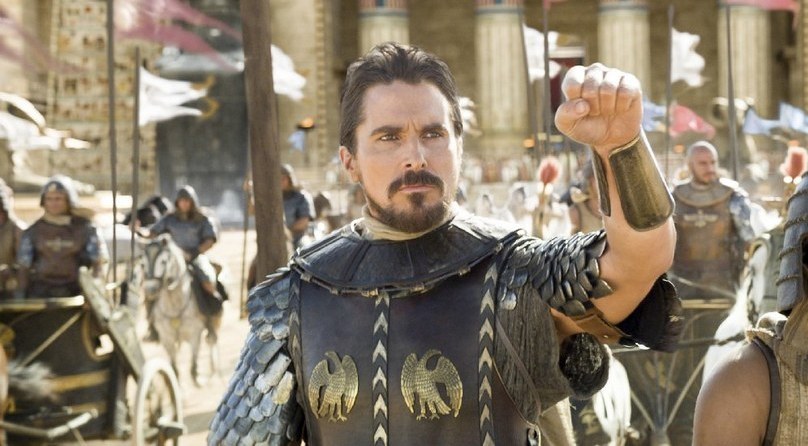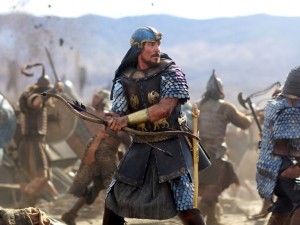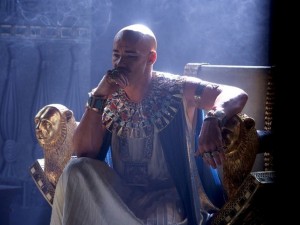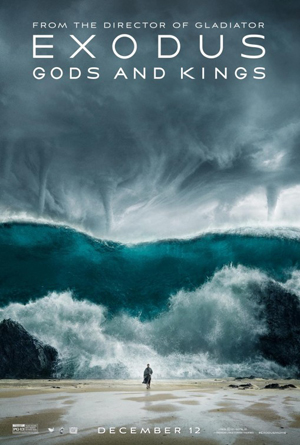
Scott’s Exodus an Epic Disappointment
Exodus: Gods and Kings, Ridley Scott’s (Alien, Blade Runner) epic retelling of the Biblical story of Moses, is a mess. The script, credited to four writers, is undercooked, does little to develop its primary characters or enliven its central storyline, just following the generally accepted scenario of the relationship between Moses and Egyptian Pharaoh Ramses without adding anything close to substantive or consequential insights. While the movie looks incredible, while its painterly images are astonishing, dramatically this one is dead on arrival, the only triumphing of the spirit going on being the viewer’s ability to sit through all 150 minutes without falling asleep.
There are moments, make no mistake. Moses’ (Christian Bale) late night, closed-door meeting with Hebrew slave Nun (Ben Kingsley) where he learns the story behind his birth and how his mother Bithiah (Hiam Abbass) came to call him son, achieves a level of emotional intimacy the majority of the picture sadly lacks. Even better is Ramses’ (Joel Edgerton) heartfelt, deeply tragic reaction to the final plague sent down to cleanse his city and force him to release the slaves from their bondage, his early interactions with his young child talking about the majesty of parental love giving it powerful weight and introspective meaning.
Really, though, that’s about it. Scott, always one knowing how to compose images of striking visual potency, does little to create anything from a dramatic standpoint that’s long lasting or personal. The Nile running red? Striking, yes, but in a clinical way, the Rube Goldberg machinations required for this first plague to come to pass far too eccentrically whimsical. Early battle scenes with Moses and Ramses fighting side-by-side for the glory of the Pharaoh Seti (John Turturro)? Expertly staged but lacking the same robust, visceral bite similar sequences in both Gladiator and Kingdom of Heaven showcased in spades.
As for the signature bits essential to this particular story, they’re hit-and-miss throughout. I really liked how Scott and company handle Moses encountering the Burning Bush, the initial entry into this seismic event for the Hebrew messiah-to-be moderately stunning. But the parting of the Red Sea? The delivering of the Ten Commandments? These sequences are oddly forgettable, more interesting from a technical perspective than they are for anything else. As for the plagues, other than the two already mentioned, they fall bizarrely flat, a couple – hail, locusts, especially frogs – going so far as to border on the unintentionally comic.
The biggest problem, though, is that both Moses and Ramses are set as individual characters right from the start and do little in the way of transformation as the film progresses. Sure, the former admittedly finds God, going from die-hard atheist to devout follower, but that change hardly feels as profound as it by all accounts needs to, the Hebrew savior as rigidly stoic from the first moment we’re introduced to him as he is when the screen fades to black. As for Ramses, other than a couple of tender moments with his infant son, he’s a selfish jerk from the jump, his histrionic behavior getting old long before he faces down his estranged brother in the soppy sand of a waterless Red Sea.
I can’t get as angry as others have over the casting of the two principals. Bale doesn’t do a bad job, and he’s no worse for the role of Moses than Charlton Heston was way back in 1956, it’s just the writing and the way the character is structured that ultimately does him a far greater disservice than his genealogy does. As for Edgerton, physically he’s every bit as striking as anything anyone could hope for, it’s just his character’s craven and supercilious one-dimensionality that makes him an aggressively tiresome bore.
The problem is the supporting cast, veterans like Turturro, Sigourney Weaver, Aaron Paul and Ben Mendelsohn all so laughably attired, so creepily made up or so comically over the top, the impressions they make are hardly winning. Then there is the depiction of God, a child speaking to Moses and giving him guidance a nice idea in theory, but in execution feels like nothing more than pandering on both Scott and the studio’s part to religious conservatives. The kid they’ve chosen, who isn’t bad, is so lily white, so remarkably Caucasian, it’s almost as if he’s stepped onto the set directly after appearing in a 1950s television sitcom and as such stands out for all the wrong reasons.
Cecil B. DeMille’s second crack at The Ten Commandments (he made a silent version in 1923) is hardly perfect. A product of its time, the movie is a large-scale epic made inside the Hollywood system and as such features a cast of recognizable superstars and character actors all of whom play things larger than life with nary an ounce of subtlety. Yet for all its excess, all its faults, the movie has heart, it has conviction, and more than that, it allows for an open dialogue about faith and religion that makes the transformation of both Moses and Ramses to have an immediate and potent intimacy that’s remained surprisingly effective almost six full decades after its original theatrical release.
Scott’s take on the material cannot say the same. Exodus: Gods and Kings doesn’t have heart, has trouble establishing an emotional connection with the viewer. On top of that, it doesn’t care to tackle the central questions in regards to faith and religion in ways that could be considered profound or complex, instead pandering to the rigidly faithful while hoping the sheer scope and size of the production will keep everyone else interested. The movie is a discombobulated jumble that fails to realize any of its inherent potential, making it one of the more frustrating disappointments released in all of 2014.
Review reprinted courtesy of the SGN in Seattle
Film Rating: 1.5 out of 4








